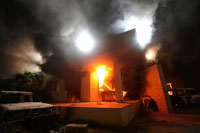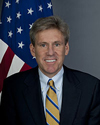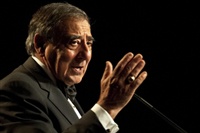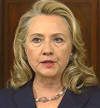U.S. drones watched attack in Benghazi
Daily News Article — Posted on October 23, 2012
 (by Tim Perone, New York Post) – The United States had an unmanned Predator drone over its consulate in Benghazi during the attack that slaughtered four Americans – which should have led to a quicker military response, it was revealed on Saturday.
(by Tim Perone, New York Post) – The United States had an unmanned Predator drone over its consulate in Benghazi during the attack that slaughtered four Americans – which should have led to a quicker military response, it was revealed on Saturday.
The network reported that the drone and other reconnaissance aircraft observed the final hours of the [over 7] hour-long siege on Sept. 11 – obtaining information that should have spurred swift action.
But as Ambassador Christopher Stevens and three [American] colleagues were killed by terrorists armed with AK-47s and rocket-propelled grenade launchers, Defense Department officials were too slow to send in the troops, Berntsen said.
“You find a way to make this happen,” Berntsen says. “There isn’t a plan for every single engagement. Sometimes you have to be able to make adjustments. They made zero adjustments in this. They stood and they watched and our people died.”
The Pentagon said it moved a team of special operators from Central Europe to Sigonella, Italy – about an hour flight from Libya – but gave no other details. [Sigonella is just an hour’s flight from Libya. Other nearby bases include Aviano, Italy and Souda Bay, Crete.] Fighter jets and Specter AC-130 gunships – which could have been used to help disperse the bloodthirsty [attackers] – were also stationed at the three nearby bases, sources told CBS.
When the attack began, Chairman of the Joint Chiefs Martin Dempsey and Defense Secretary Leon Panetta “looked at available options, and the ones we exercised had our military forces arrive in less than 24 hours, well ahead of timelines laid out in established policies,” a White House official told the network.
Even as the administration continues to vow that the perpetrators will be brought to justice, the man identified by witnesses as a ringleader in the attack continues to walk the streets of Libya without fear of arrest.
Ahmad Abu Khattala has admitted being at the consulate during the horrific attack but has yet to be questioned by any Libyan authorities.
Abu Khattala spoke to a New York Times reporter Thursday from a hotel patio as he sipped a strawberry frappe and mocked the U.S. and Libyan governments. “These reports say that no one knows where I am and that I am hiding,” he boasted. “But here I am in the open, sitting in a hotel with you. I’m even going to pick up my sister’s kids from school soon.”
[Lack of] security at the consulate was an open secret. Stevens wrote a cable in June that there wasn’t enough security at the consulate, and he noted there had been a recent spike in attacks against “international organizations and foreign interests,” ABC News said.Ambassador Stevens wrote another cable in August that read, “A series of violent incidents has dominated the political landscape during the Ramadan holiday.” He said that the incidents were “organized” and that the Libyan security force had “not coalesced into a stabilizing force and [provided] little deterrence.”
Several requests for additional security in Benghazi were made to the State Department prior to the attack. They were all rejected. [Apparently there was no military security guarding the consulate in Benghazi – only a few former military personnel.]
Secretary of State Hillary Rodham Clinton tried to deflect blame from President Obama last week, saying the decision not to beef up guards was her responsibility. “I’m in charge of the State Department’s 60,000-plus people all over the world [at] 275 posts,” she told CNN. “The president and the vice president wouldn’t be knowledgeable about specific decisions that are made by security professionals. They’re the ones who weigh all of the threats and the risks and the needs and make a considered decision.”
The attack has become a major issue in the presidential campaign, with Mitt Romney saying Obama’s failure to safeguard the consulate highlights his failure in foreign policy.
Romney has also [criticized] Obama for failing to immediately label it a terror attack and the administration for changing its story about whether the attack was a protest over an anti-Islamic movie or a coordinated [terrorist] strike.
The tragedy – and alleged security lapses leading up to the attack – [were] brought up at [last night’s] final presidential debate.
The 90-minute debate [was] moderated by Bob Schieffer of CBS News. Schieffer…listed five subject areas, with more time devoted to the Middle East and terrorism than any other topic.
Reprinted here for educational purposes only. May not be reproduced on other websites without permission from The New York Post. (Note: Bracketed additions to the article are from the CBS News article.)
Questions
1. What information was revealed over the weekend about the September 11 terrorist attack on the U.S. consulate in Benghazi in which four Americans (including our ambassador) were murdered?
2. a) Who is Gary Berntsen?
b) Why did Mr. Berntsen criticize Defense Department officials regarding the attack on the U.S. consulate in Behghazi?
3. What information did the Pentagon give the media about the actions they took on September 11?
4. The CBS News report states: "Add to the controversy the fact that the last two Americans didn't die until more than six hours into the attack, and the question of U.S. military help becomes very important." Do you think Defense Secretary Panetta, Joint Chiefs Chairman Martin Dempsey and President Obama should have ordered military backup to fly into Benghazi? Explain your answer.
5. The attack took place over a month ago. The Obama administration has vowed to bring the terrorists to justice. What did the ringleader of the attack, Ahmad Abu Khattala, tell the New York Times in an interview last week?
6. a) What did Ambassador Stevens ask the State Department for several times prior to the attack? What were his reasons for the request?
b) How did the State Department respond?
7. a) What has Republican presidential candidate Mitt Romney said about President Obama's role in lack of U.S. response to the attack?
b) Do you think Gov. Romney's criticism is a fair assessment of the president's foreign policy leadership? Explain your answer.
8. The media has reported that Republican members of Congress are calling on the Obama administration to explain what they knew about the attack, and when they knew it. Do you think Democrat members of Congress should also ask the same questions? Who is "playing politics" - the Democrats or the Republicans? Explain your answers.
OPTIONAL: Watch the Oct. 22 presidential debate at c-span.org.
a) What questions did debate moderator Bob Schieffer ask President Obama about the report on a U.S. drone during the presidential debate on foreign policy last night?
b) What do you think of President Obama's response?
Background
About the Pentagon:
The Department of Defense (also known as the Defense Department, DoD or the Pentagon) is the Executive Department of the U.S. government charged with coordinating and supervising all agencies and functions of the government concerned directly with national security and the U.S. armed forces. The Pentagon building is the headquarters of the Department of Defense, located in Arlington County, Virginia. As a symbol of the U.S. military, "the Pentagon" is often used to refer to the Department of Defense rather than the building itself. (from wikipedia)
The current Secretary of Defense is Leon Panetta.
About the U.S. State Department:
The U.S. Department of State advises the President in the formulation and execution of foreign policy and promotes the long-range security and well-being of the United States. The Department determines and analyzes the facts relating to American overseas interests, makes recommendations on policy and future action, and takes the necessary steps to carry out established policy. ...The Department ... negotiates treaties and agreements with foreign nations; speaks for the U.S. in the United Nations and other international organizations in which the U.S. participates; and represents the U.S. at international conferences. (from about.com)
The Department operates the diplomatic missions [embassies and consulates] of the U.S. abroad and is responsible for implementing our foreign policy and diplomacy efforts.
The Department is led by the Secretary of State, who is nominated by the President and confirmed by the Senate and is a member of the Cabinet.
The current Secretary of State is Hillary Clinton. The Secretary of State is the first Cabinet official in the order of precedence and in the presidential line of succession.
(from wikipedia)



